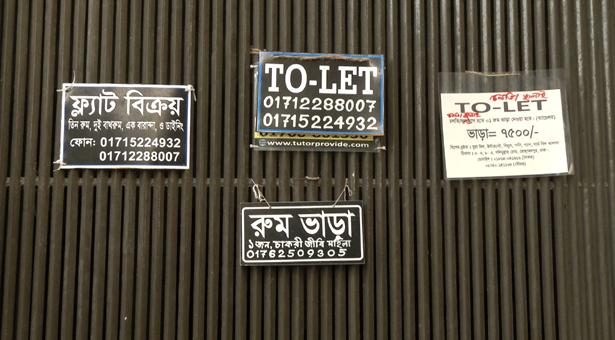
Flat owners face tenant crisis

A high percentage of flat or apartment owners in most metropolitan cities are facing serious crisis of tenants amid the ongoing coronavirus pandemic.
In the wake of Covid-19 pandemic a large number of middle-income and low-income working people left cities facing financial hardship and opted to stay in their village homes until situation improves or secure jobs or pursue a stable income again.
As a large number of residences in city and other metropolitan cities and district towns remain vacant, placards containing ‘To-Let’, ‘House for Rent’ are seen almost everywhere from the uptowns to the ordinary neighbourhoods.
Many such residence owners are said to rent out their flats even if it fetches much cheaper monthly rent. Many of these home owners expressed renting out their flats on urgent basis because they badly need income.
“I don’t have any income other than renting out flats which I own since 2016. All five flats remain vacant since May,” said Jamshed Ali, a resident in Shewrapara in Mirpur area.
Since the beginning of the corona pandemic, millions of people lost jobs or could not continue their business and majorities of them were forced to leave the respective cities.
Mashuk Ahmed, a flat owner in Lalmatia, said, "Four of the apartments I own remain vacant since June. The previous tenants had shifted to cheaper places, and ever since then I have not found tenants."
The rent for a single apartment Mashuk owns is Tk 20,000, excluding service charges. The landlord has never gone through such a crisis of tenants.
As the coronavirus pandemic is racing around with no sign of stopping anytime soon and new fears of second wave started, searching for new accommodation or shifting houses has become very difficult. The internal cause is that many tenants under the spectra of losing employment cannot afford to rent costly accommodation anymore.
Dilara Jahan, a flat owner who manages three apartments at New Baily road, said that two of her apartments have remained vacant for the last six months. And some of the current tenants staying in the remaining apartments, had informed her that they would move elsewhere in December. Meanwhile, some others are delaying rent payments.
"One of the tenants, a school teacher, left my apartment in October after he failed to run the school with neither any student nor donation. This month, he has shifted to a classroom of the school with his family members," Dilara said.
This correspondent, while walking through the streets of Mohammadpur, Lalmatia and Dhanmondi area on Sunday, found a lot of to-let signs and posters on notice boards of many buildings.
Many flat owners were unwilling to speak about their financial crisis. However, they expressed frustrations over utility bills and service charges which have to be paid every month, no matter if the flats remain empty or occupied.
Many people suggested government’s intervention to address the problem.
However, a survey report of Consumers Association of Bangladesh (CAB) said the house rent in the city on average increased by 16 percent in 2011 while Bangladesh Bureau of Statistics report shows 11 percent rise in inflation in the same year. The report also says house rents in the capital have increased by 249.62 percent in the last 19 years. The house rent in the capital jumped by 23 percent in 1991.
The house rent rose by 15.83 percent in 2011 compared to that in 2010. House rent of a two-room flat in a concrete building increased by 13.27 percent, tin-shed by 14.71 percent, bachelor house by 17.39 percent and slum house by 17.95 percent in the same year while 14 percent in 2006, 22 percent in 2007, 21 percent in 2008 and 15 percent in 2009.
Editor & Publisher: S. M. Mesbah Uddin
Published by the Editor from House-45,
Road-3, Section-12, Pallabi, Mirpur
Dhaka-1216, Bangladesh
Call: +01713180024 & 0167 538 3357
News & Commercial Office :
Phone: 096 9612 7234 & 096 1175 5298
e-mail: financialpostbd@gmail.com
HAC & Marketing (Advertisement)
Call: 01616 521 297
e-mail: tdfpad@gmail.com